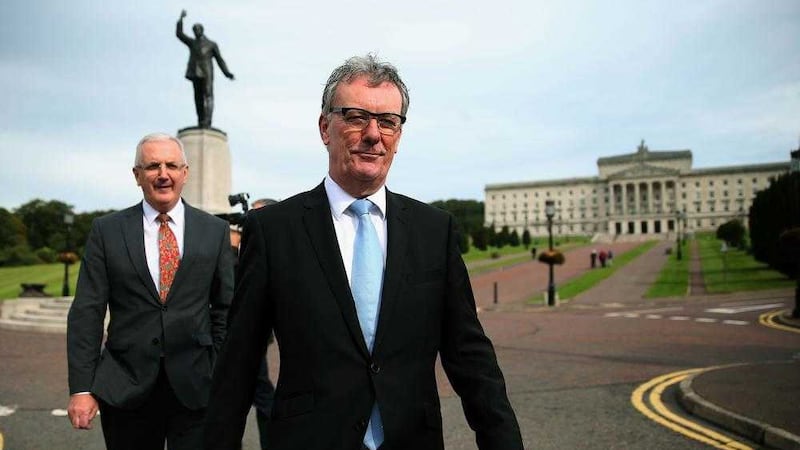His family buried Kevin McKee yesterday, the 17 year old west Belfast boy ‘disappeared’ by the IRA all of 43 years ago. That heart-breaker of a photo made another appearance, the childlike fragile face, the 70s long hair.
A small convoy set out for a family grave, as yet another Stormont recitation (also known as ‘talks’) of grievance and mutual suspicion reconvened. The funeral of 25 year old Seamus Wright, whose body turned up with McKee’s in the same bogland spot, is to take place today.
There are bodies still missing, other IRA legacies no doubt waiting to erupt up ahead. Sinn Féin may have to trot out variations on their favourite far-fetched and dogged themes for years to come. Even if the IRA that flies on one wing doesn’t create fresh unease of its own accord.
Who saw the Jock Davison/Kevin McGuigan mess coming? The extra element to the present circus, also unforeseen, is the most successful outing to date for Mike Nesbitt’s new staging of Ulster Unionism. With some bloodthirsty help from those who killed Davison and McGuigan, Mike may have managed where dissident republican bombs and bullets failed to finish off Stormont.
We were wrong to say Nesbitt lacked a plan. Turns out it’s just the same old plan: UUP versus DUP. Do unto them what they did to us, slug it out for the soul of unionism no matter how much badness we stir up on the way, out-hardline a DUP grown too fond of Stormont.
So Mike runs genteel Danny Kinahan and Orange Order veteran Tom Elliott for election, revived broad church Ulster Unionism. While flag protesters mess up their city and themselves he sits and smiles with Billy Hutchinson and Peter Robinson.
Legitimate grievance – because how can it be legitimate for IRA killers to still operate? – has layered nicely over well-established political rivalry and undiminished, still sharp unionist refusal to accept the need and the virtue of power-sharing. Whatever works, and work it has: seats in Westminster again, a Robinson leadership that is now more hiccups and absence than steadiness. This time out, Robinsonian clever tricks make the audience want to look away.
Violent death in Short Strand was grist to the Ulster Unionist mill, a belated neat fit with killing in the Markets; revenge among old killers, then political revenge served cold on the DUP. Nesbitt still talked himself into incoherence on when and why it’s ok for him and other unionist politicians to line up with paramilitaries, but he certainly seized his moment. Whereas the SF leadership, like Robinson, has been all thumbs.
Did nobody try to talk Martin McGuinness on Sunday out of his ‘state agents’? Mary Lou McDonald could surely have told him how duff that kind of language sounds now anywhere beyond the old heartlands – but then they were in the Roddy McCorley social club.
Until Sunday’s press conference, it had been the one small mercy of this season’s crisis that the SF front row was sparing us their spectre of dark forces, securocrats. No, wait, McGuinness threw in a ‘cabal’ the other day. Then came a presentation with a bit of everything : Bobby Storey’s flight of fancy, McGuinness and his ‘people who are opposed to the peace process’, who don’t share the SF agenda nor that of ‘first minister Robinson’ - the McGuinness ritual stroke for the DUP leader that is so rarely reciprocated.
Plus we had Gerry Adams giving the father of the nation pat on the head to those ‘who may expect us to be more aggressive or assertive or frank around the calamity that has been contrived.’ But the leadership job was to try and steer a course.
Watching developments in the past fortnight has been a little like faces and voices of people glimpsed on a runaway train, some surprising, at least one touching: the Reverend Harold Good, stooped and frail, pleading on the top of Stormont’s windy steps for the peace he helped to bring, by going to witness what he believed to be a comprehensive IRA decommissioning.
Then there was Nigel Dodds, staggered to hear David Cameron wax impassioned on the peace brought by agreement, imploring Dodds across the Commons that his party and others should rise to the occasion and agree again. What was it that Dodds mouthed back? It looked very much like ‘that wasn’t us.’
He could of course have simply been stumped, to hear such eloquence for peace from a prime minister boastful about sending drones to murder British citizens.








